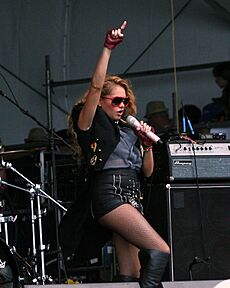Paulina Rubio facts for kids
Quick facts for kids
Paulina Rubio
|
|
|---|---|

Rubio in 2012
|
|
| Born |
Paulina Susana Rubio Dosamantes
17 June 1971 Mexico City, Mexico
|
| Occupation |
|
| Years active | 1980–present |
|
Works
|
|
| Spouse(s) |
Nicolás Vallejo-Nágera
(m. 2007; div. 2014) |
| Partner(s) |
|
| Children | 2 |
| Parent(s) | Susana Dosamantes Enrique Rubio |
| Awards | Full list |
| Musical career | |
| Genres | |
| Instruments |
|
| Labels |
|
Paulina Susana Rubio Dosamantes (born June 17, 1971) is a famous Mexican singer, songwriter, and TV star. She is known as "The Golden Girl" and has sold over 15 million records, making her one of the best-selling Latin music artists ever.
Paulina first became famous as a member of the pop group Timbiriche from 1982 to 1991. After leaving the group, she started her solo career. Her first albums, La Chica Dorada (1992) and 24 Kilates (1993), were very successful. In the mid-1990s, she explored dance and electronic music with her albums El Tiempo Es Oro (1995) and Planeta Paulina (1996).
Her album Paulina (2000) was a huge international hit. It is often called one of her best albums. This success made her the top-selling Latin music artist of 2001 according to Billboard. She continued to top the charts with her albums Border Girl (2002) and Pau-Latina (2004), which earned her nominations for the Grammy Award and Latin Grammy Award.
In the 2010s, Paulina became a coach on popular TV talent shows like La Voz... Mexico and The X Factor USA. She has had five number-one singles on the U.S. Billboard Hot Latin Songs chart. Because of her influence, she is considered a pop icon and one of the most important female artists from Mexico.
Contents
- Life and Career
- 1971–1981: A Star from Birth
- 1982–1990: The Timbiriche Years
- 1991–1994: Becoming "The Golden Girl"
- 1995–1999: New Sounds and a Reunion
- 2000–2003: International Stardom
- 2004–2008: Pau-Latina and Ananda
- 2009–2012: Pop, Motherhood, and TV
- 2013–2017: Judging on TV and New Music
- 2018–Present: Deseo and Recent Projects
- Artistry and Legacy
- Other Work
- Discography
- See also
Life and Career
1971–1981: A Star from Birth
Paulina Susana Rubio Dosamantes was born in Mexico City. Her father, Enrique Rubio González, was a lawyer. Her mother, Susana Dosamantes, was a very popular actress in Mexico. Because her mother was so famous, Paulina said, "I've been famous since I was born."
Growing up, Paulina was always around cameras and movie sets. She took lessons in singing, acting, jazz, and dance at the Centro de Educación Artística (CEA). When she was nine, her parents were asked if she could join a new kids' music group. Paulina had already tried out for the group without telling them. Her parents agreed, as long as she earned good grades in school.
1982–1990: The Timbiriche Years
Paulina's career started when she was nine years old with the band Timbiriche. The group first appeared on TV on April 30, 1982. Timbiriche was made up of six children from the CEA arts school. Their first albums were a big success in Mexico with songs like "Somos Amigos" and "Hoy Tengo Que Decirte Papá."
In 1984, the band starred in a Spanish version of the musical Grease. This was Paulina's first time in a professional musical. As the band members grew up, they became teenage idols. Their music style changed to pop-rock, and their 1987 album Timbiriche VII sold one million copies.
By the late 1980s, Paulina was one of the most popular members of the group. She also acted in her first telenovela, Pasión y Poder. After recording the album Timbiriche X, she left the group in 1990 to start her own career as a solo artist.
1991–1994: Becoming "The Golden Girl"
In 1991, Paulina went to Spain to record her first solo album. She also starred in the telenovela Baila Conmigo in 1992. Her role as a rich and spoiled girl earned her good reviews.
In August 1992, she released her first single, "Mío". The song was a massive hit in Mexico and reached number three on the Billboard Hot Latin Tracks chart in the United States. Her debut album, La Chica Dorada (which means "The Golden Girl"), was released in October 1992. The album was very successful and sold over 450,000 copies in Mexico.
Her second album, 24 Kilates, came out in 1993. It sold 150,000 copies even before it was released. The first single, "Nieva, Nieva", was number one on the radio in Mexico. Paulina's popularity continued to grow, and she toured all over Latin America.
1995–1999: New Sounds and a Reunion
In 1995, Paulina released her third album, El Tiempo Es Oro. It had a more dance-friendly sound. The lead single, "Te Daría Mi Vida", was a big hit. That same year, she starred in her first movie, Bésame en la Boca.
Her fourth album, Planeta Paulina (1996), had a very modern, electronic sound. Paulina co-wrote and co-produced many of the songs, showing her creative side. Although it wasn't as big a seller as her other albums, it helped her connect with the gay community because of its supportive themes.
In 1998, Paulina reunited with the original members of Timbiriche for a successful tour. They sold out more than 20 concerts at the National Auditorium in Mexico City. They also released a live album that sold over 350,000 copies.
2000–2003: International Stardom
Paulina signed with Universal Music and released her fifth album, Paulina, in 2000. The album was a huge success around the world. It mixed many genres like pop, ranchera, and rock. It became her first number-one album on the Billboard Top Latin Albums chart and sold over 3 million copies worldwide.
The album had many hit singles. "Lo Haré Por Ti" was a top 10 hit in Spain. "Y Yo Sigo Aquí" reached number one in over 30 countries. The song "Yo No Soy Esa Mujer" became a feminist anthem. Her style during this time, with cowgirl hats and mini-skirts, became a fashion trend.
In 2002, she released Border Girl, her first album with songs in English. It debuted at number eleven on the U.S. Billboard 200 chart. The single "Don't Say Goodbye" was a top 40 hit in the U.S. She toured with Enrique Iglesias and was named the "Mexican Artist with Greatest International Projection."
2004–2008: Pau-Latina and Ananda
Paulina's seventh album, Pau-Latina, was released in 2004. The album mixed pop with Latin folk music. It debuted at number one on the Top Latin Albums chart and was nominated for a Grammy Award.
The first single, "Te Quise Tanto", became her first number-one hit on the Billboard Hot Latin Songs chart. Two other singles, "Dame Otro Tequila" and "Algo Tienes", were also huge hits.
Her next album, Ananda (2006), also hit number one on the Latin charts. The title is a Sanskrit word for "happiness." The lead single, "Ni Una Sola Palabra", became her third number-one hit in the U.S. and was very popular in Spain. In 2007, she married Spanish businessman Nicolás "Colate" Vallejo-Nájera.
2009–2012: Pop, Motherhood, and TV
In 2009, Paulina released Gran City Pop. The album was inspired by the cities of Miami, Mexico, and Madrid. The first single, "Causa y Efecto", was her fourth number-one hit on the Hot Latin Songs chart. The album was nominated for a Grammy Award.
In 2010, Paulina announced she was expecting her first child. Her son, Andrea Nicolás, was born in November 2010.
Her tenth album, Brava!, was released in 2011. It featured a mix of Spanish and English songs. The lead single, "Me Gustas Tanto", became her fifth number-one hit on the Hot Latin Songs chart. In 2012, she was a coach on the TV show La Voz... Mexico. That same year, she and her husband separated.
2013–2017: Judging on TV and New Music
In 2013, Paulina was a coach on La Voz Kids in the U.S. Later that year, she became a judge on the American version of The X Factor, alongside Simon Cowell and Demi Lovato. She was the first Mexican artist to be a judge on an American singing competition show.
She released a new single in 2015 called "Mi Nuevo Vicio" with the group Morat. It was a huge hit in Spain and was certified double platinum. In 2016, her second son, Eros, was born. She released another single, "Me Quema", later that year.
2018–Present: Deseo and Recent Projects
Paulina's eleventh album, Deseo, was released in 2018. In 2019, she returned to television as a coach on the Spanish versions of La Voz and La Voz Senior.
In 2020, she collaborated with musician Raymix on the song "Tú Y Yo", which went to number one in Mexico. In 2021, she signed a new record deal with Sony Music and released the single "Yo Soy".
In 2022, Paulina teamed up with fellow Mexican singer Alejandra Guzmán for a joint tour in the United States called the Perrísimas Tour. She has continued to release new songs, including "Me Gusta" and "Propiedad Privada."
Artistry and Legacy
Paulina was inspired by her actress mother, Susana Dosamantes, and grew up loving music from artists like The Beatles and Queen. She has often been compared to Madonna for her image and exciting stage shows, but she has created her own unique style.
Her music is a mix of Latin pop, dance-pop, and pop-rock. She is known for blending traditional Mexican sounds like mariachi with modern pop and hip-hop. Her songs often talk about love, fun, and female empowerment.
Paulina is known as "La Chica Dorada" ("The Golden Girl") and the "Queen of Latin Pop." She is considered a pop culture icon in Latin America. She has influenced many younger artists and is seen as a powerful female figure in the music industry.
Other Work
Besides music, Paulina has been involved in many other projects. She has had endorsement deals with brands like Dr Pepper and MAC Cosmetics. In 2009, she launched her own perfume called "ORO." She has also designed a line of bags and shoes with JustFab.
Paulina is also known for her charity work. In 2009, she started the Paulina Rubio Foundation to help children with neurological disorders. She has also worked with the Latino Commission on AIDS and the American Heart Association.
Discography
- La Chica Dorada (1992)
- 24 Kilates (1993)
- El Tiempo Es Oro (1995)
- Planeta Paulina (1996)
- Paulina (2000)
- Border Girl (2002)
- Pau-Latina (2004)
- Ananda (2006)
- Gran City Pop (2009)
- Brava! (2011)
- Deseo (2018)
See also
 In Spanish: Paulina Rubio para niños
In Spanish: Paulina Rubio para niños
- Honorific nicknames in popular music
- Music of Mexico
- Latin pop
- List of Hispanic and Latino Americans
- Latin American music in the United States
- List of best-selling albums in Mexico
- List of best-selling Latin music artists
- List of most expensive music videos
 | Delilah Pierce |
 | Gordon Parks |
 | Augusta Savage |
 | Charles Ethan Porter |







